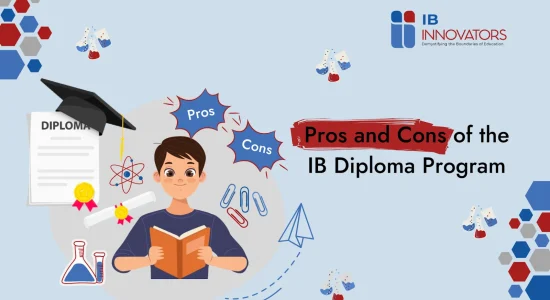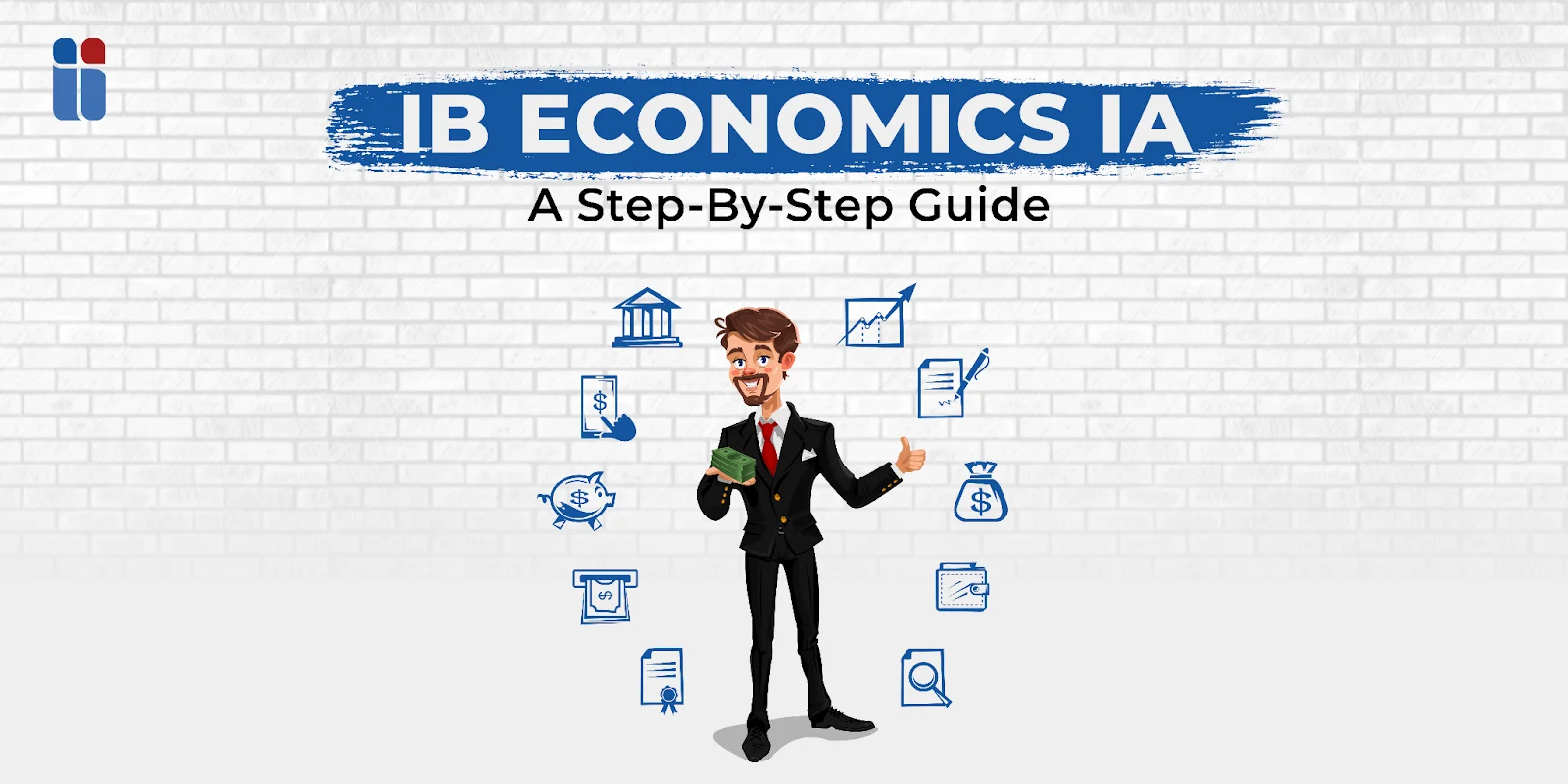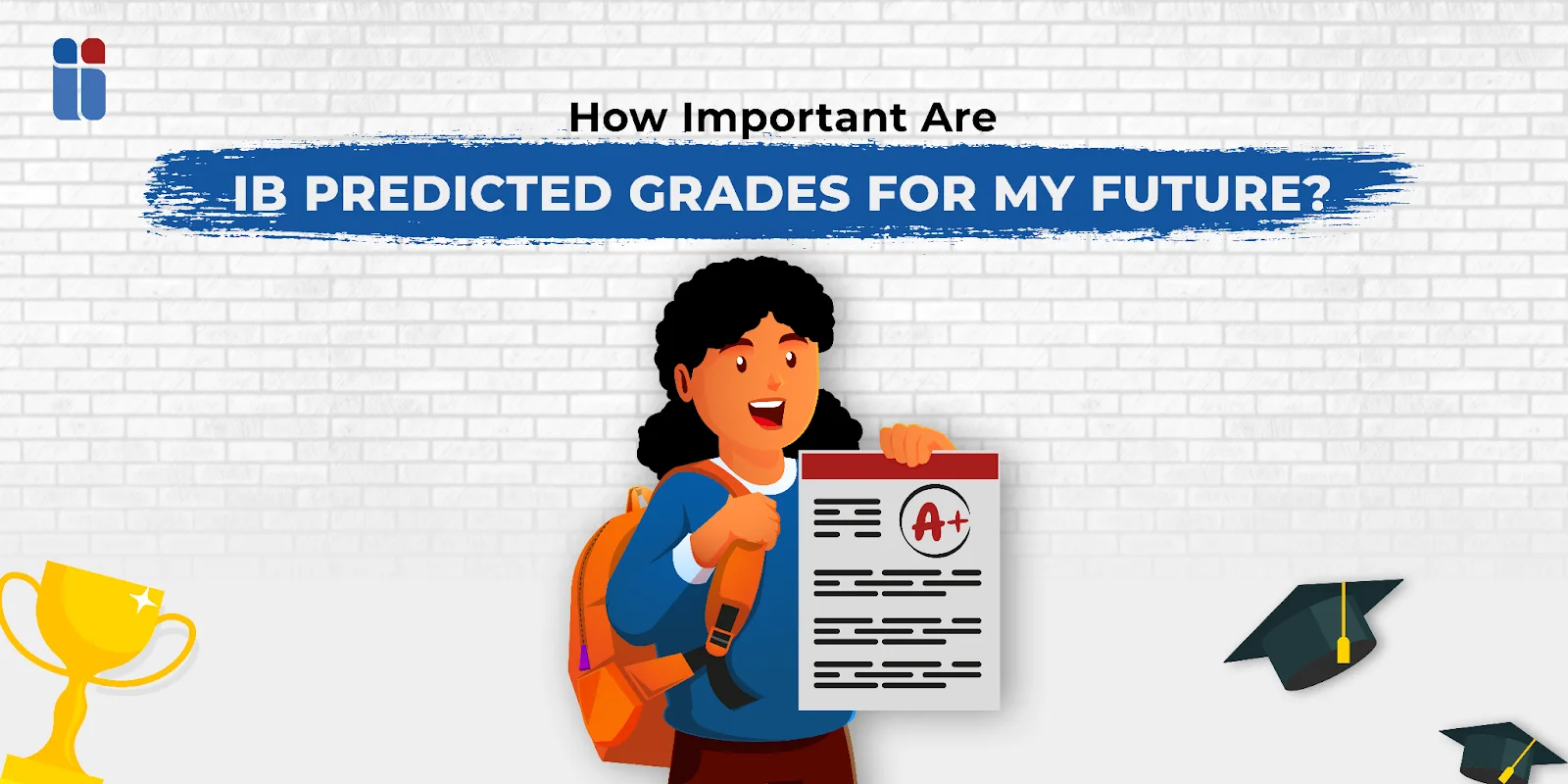Are you considering investing in a prestigious educational qualification like the IB Diploma? Wondering if it truly shapes your future and opens doors to top universities worldwide?
So many questions appeared before us when deciding whether the IB Program is worth the sleepless nights and intense study sessions.
Relax, it’s fine. We’ve all grappled with the same concerns.
So before committing to such a demanding curriculum, it’s crucial to understand both IB program benefits and potential drawbacks.
This blog will review the pros and cons of an IB diploma to help you decide whether it’s the right path for your academic journey.
Contact us for IB tutoring and ace your IBDP exams with IB Innovators Expert Tutors!
What is the Goal of the IB Diploma Program?

IB Diploma delivers an exceptional academic experience combined with a commitment to excellence, personal growth, and social responsibility.
According to an international study by the end of the IB Diploma Program, 98% of students aimed to earn at least a bachelor’s degree and 81% aspired to pursue a master’s, doctoral, or professional degree.
It not only fosters intellectual development but also shapes the personality of the student. The program encourages students to think critically, rather than simply rote learning information and develops an appreciation for diversity and cultural heritage.
With a focus on holistic development, the IB cultivates skills in various fields such as leadership, communication, arts, and athletics, while helping students develop essential life skills like time management.
Ultimately, the IB aims to prepare students for lifelong learning and guide them toward achieving their goals.
What IB Diploma Offers to Students?

Students who thrive in a challenging environment can benefit from the IB Program. It suits critical thinkers who value independent analysis over memorization.
A study in Australia found that IB alumni and current students reported improvements in their critical thinking skills over the two years of the IB Diploma Program. Second-year students, in particular, were more likely to use a wider range of these skills compared to first-year students.
Global-minded learners looking to expand their cultural awareness and embrace diverse perspectives will find value in its international framework.
The IB diploma program is ideal for well-rounded students who want to develop holistically through academics, creativity, and community service. It’s also tailored for organized individuals with strong organizational and time-management skills.
The International Baccalaureate is perfect for university-bound students seeking an internationally recognized qualification.
Comparison to Other Educational Programs

The International Baccalaureate Diploma Program (IBDP) offers a well-rounded education approach compared to qualifications like A-Levels and Advanced Placement (AP).
While A-levels focus on subject specialization, the IB encourages a broader curriculum, fostering critical thinking, global awareness, and interdisciplinary connections.
In the UK, IB Diploma Program (DP) students achieved more positive outcomes in higher education than their peers who took A-Levels. DP students often perform better in areas like critical thinking, global awareness, and preparedness for university studies.
The holistic nature of the IB helps foster both academic and personal development, making DP students more likely to excel in various aspects of higher education
IB Diploma Program Pros and Cons
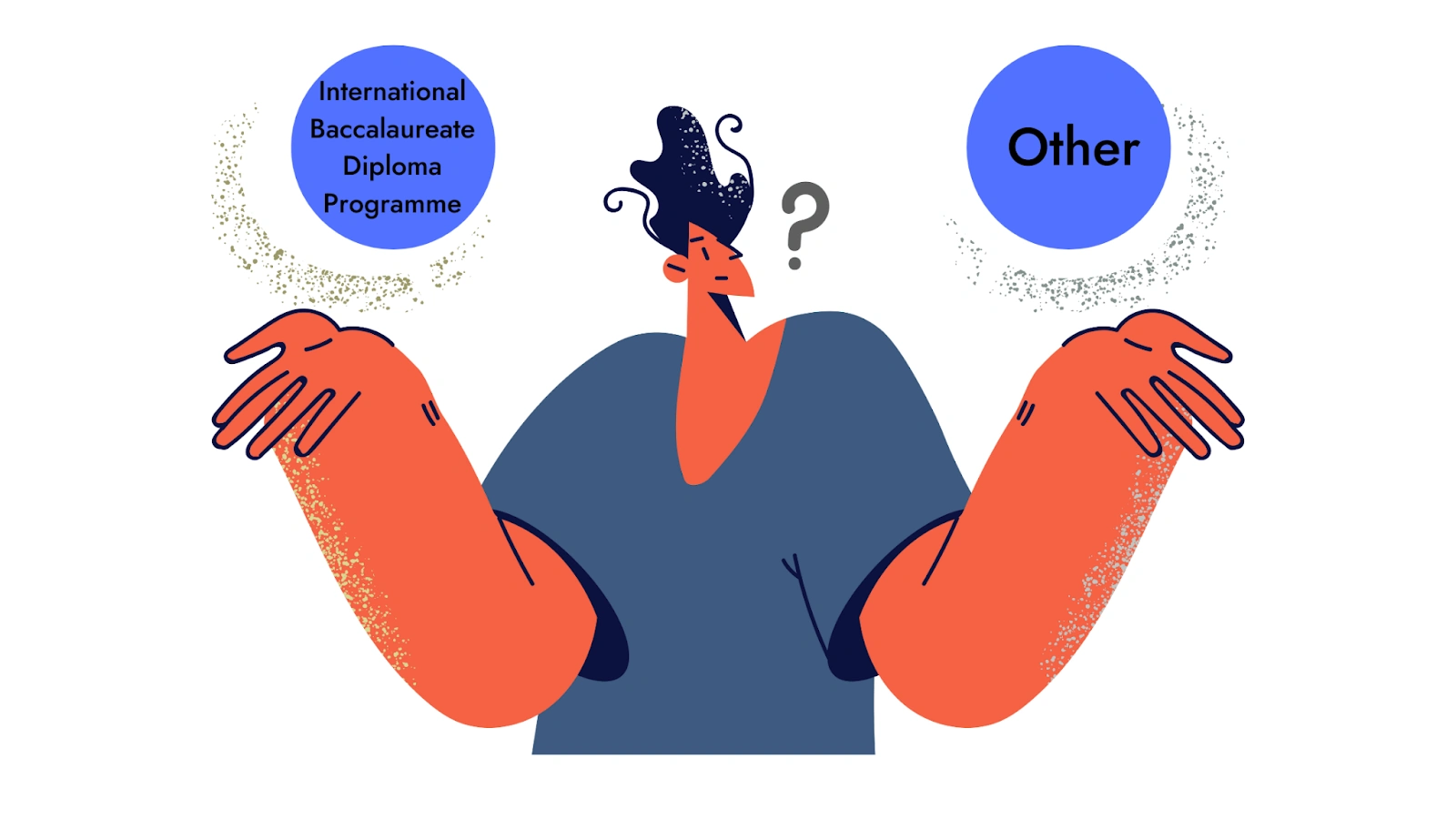
The International Baccalaureate Diploma Programme (IBDP) is a globally recognized curriculum known for its rigor and holistic approach to education.
Like any academic program, it has its advantages and disadvantages, which vary based on individual circumstances, goals, and learning preferences.
Here’s a balanced exploration of the pros and cons of the IB Diploma Programme for students.
Pros of the IB Diploma Programme
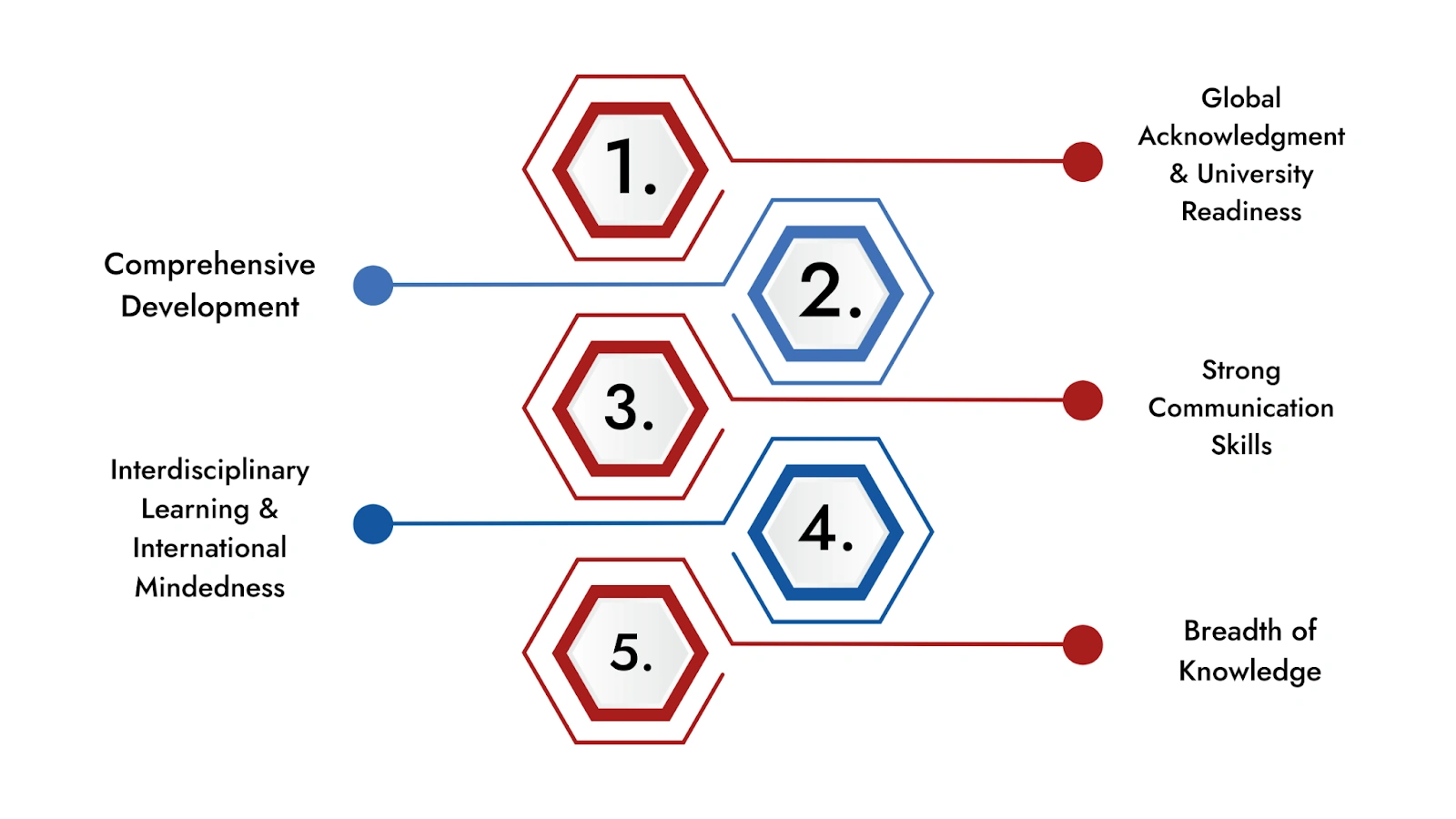
Global Acknowledgment and University Readiness:
One of the most significant advantages of the IB Diploma is its global recognition by universities. Whether you’re aiming to study in the UK or abroad, universities respect the depth and breadth of knowledge that the IB cultivates.
Many higher education institutions regard IB graduates as well-prepared, often because the curriculum emphasizes critical thinking, research, and interdisciplinary learning.
Moreover, students completing the IB have often developed university-level study habits, which can make the transition to higher education smooth.
Comprehensive Development:
The pros of the IB Diploma Programme go beyond academics by focusing on holistic education.
Through its core elements, such as the Theory of Knowledge (TOK), Creativity, Activity, Service (CAS), and the Extended Essay, students are encouraged to explore real-world problems and engage with their communities.
This emphasis on personal growth, alongside academics, fosters well-rounded individuals who can think critically and creatively.
Strong Communication Skills:
IBDP students often excel in communication due to the program’s focus on presentations, group work, and collaborative projects.
Activities such as CAS, oral exams in languages, and extended essays improve students’ ability to express themselves clearly and argue their points effectively—skills that are valuable both in university and the workplace.
Interdisciplinary Learning and International Mindedness:
In many pros, one of the advantages of the IB diploma program is its structure. The IB curriculum encourages students to connect different areas of knowledge, making learning interdisciplinary.
For example, while studying history, students might also consider philosophical or ethical dimensions, fostering a deeper understanding of global issues. This international mindset is further enhanced through the program’s encouragement of multilingualism, cultural awareness, and global citizenship.
The breadth of Knowledge:
Unlike other qualifications where students may focus on just three or four subjects, one of the advantages of the IB program is it requires students to study six subjects from different disciplines.
This structure ensures that students don’t specialize too early and gain a well-rounded education that covers humanities, sciences, mathematics, and languages.
Cons of the IB Diploma Programme
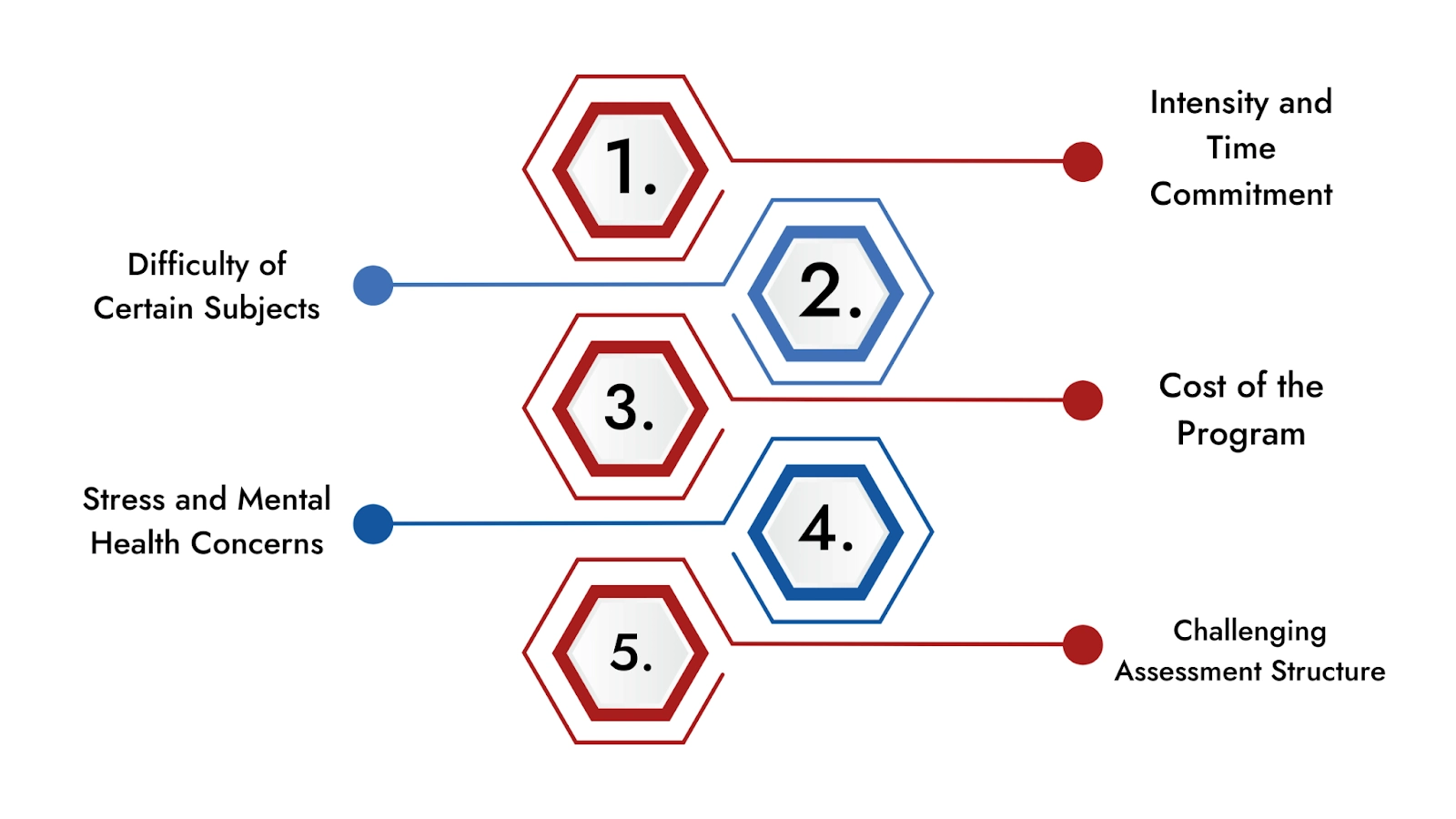
Intensity and Time Commitment:
The IB Diploma is known for being academically demanding. With six subjects to study alongside core components like the Extended Essay and CAS, students often find the workload intense.
Balancing time between coursework, extracurricular activities, and maintaining a personal life can be challenging and regarded as one of the disadvantages of the IB Diploma Program. Some students may feel overwhelmed, particularly if they struggle to manage time effectively.
Difficulty of Certain Subjects:
Some IB subjects, particularly in higher level (HL) courses, are known for being exceptionally tough. For instance, subjects like IB Mathematics HL, Chemistry HL, or Physics HL can be daunting, and not all students can perform well across such a broad spectrum of disciplines.
This contrasts with other qualification systems, such as A-Levels in the UK, where students may choose to focus on subjects they are strong in or passionate about.
Cost of the Programme:
One of the cons of the IB Diploma Program is that it can be expensive compared to other secondary school programs, particularly in private or international schools that charge high tuition fees. The costs can include exam fees, materials, and potential tutoring expenses.
This can be a financial burden for some families, making it less accessible for students from lower-income backgrounds. While some public schools offer the IB, in many cases, the program is only available in private institutions, limiting opportunities for those in less affluent areas.
This disadvantage of the IB program can be particularly relevant when considering the availability and affordability of education options for students across different socioeconomic backgrounds.
Stress and Mental Health Concerns:
Due to its demanding nature, some students may experience significant stress or burnout while completing the IB Diploma.
The extended deadlines, coupled with the high expectations in terms of academic performance and extracurricular involvement, can take a toll on mental health.
Challenging Assessment Structure:
The IB’s assessment system can be daunting for some students, as it combines internal assessments with externally marked exams at the end of the two-year program.
This means students are under constant evaluation, and final exams carry significant weight in determining their overall grades. For students who may not perform well under exam pressure, this can create anxiety.
Unlike A-Levels, where students may have the option of taking exams in stages (modular format), the IB assessment method can feel unforgiving, placing added pressure on students throughout the program.
This structure can make it difficult for students who prefer ongoing assessments or more flexible exam schedules, making the IB less appealing for those who do not thrive in high-stakes exam environments.
Final Remarks: Is IB The Right Choice Or Not?
The IB Diploma Programme is a fantastic opportunity for students who seek a broad, interdisciplinary education that goes beyond the traditional classroom. It fosters critical thinking, international-mindedness, and a holistic approach to learning.
However, the program is not for everyone. It requires a high level of commitment, time management, and adaptability. For students who thrive in a challenging, well-rounded environment, the IB can be an excellent stepping stone to success in university and beyond.
But for those who prefer specialization or struggle with heavy workloads, alternative academic routes like A-Levels may be a better fit.
Ultimately, whether the IB is the right choice depends on a student’s learning style, career aspirations, and academic goals.
Read our other blogs and take the next step toward IB success!
FAQs
Yes, the IB Diploma Program is worth it for students who want a globally recognized qualification that builds critical thinking, research, and time management skills. While the program is challenging, it prepares students well for university and beyond.
With IB Innovators’ personalized tutoring, students can navigate challenges more easily and maximize their success.
The IB Diploma is known for its rigorous curriculum, high expectations, and time management challenges. Students often struggle with the intense workload, the extended essay, and balancing multiple subjects.
At IB Innovators, our experienced IB tutors provide personalized support, helping students develop effective study habits, manage time efficiently, and master key concepts.
We also offer subject-specific tutoring to address areas where students need extra help.
Yes! IB Innovators specializes in helping students achieve their best possible grades, even in the face of IB’s academic pressure. Our IB tutors work closely with students to identify areas of improvement and tailor lessons to fit their learning style.
Whether students need help understanding complex topics or improving exam techniques, our personalized tutoring services are designed to help students excel in the IB Diploma program.
Many IB students feel overwhelmed by the sheer amount of coursework and exam preparation. IB Innovators offers targeted revision courses, regular assessments, and one-on-one tutoring to help students manage their workload effectively.
Our structured approach ensures that students stay on track with deadlines while mastering each subject area, giving them the tools they need to stay organized and reduce stress.



